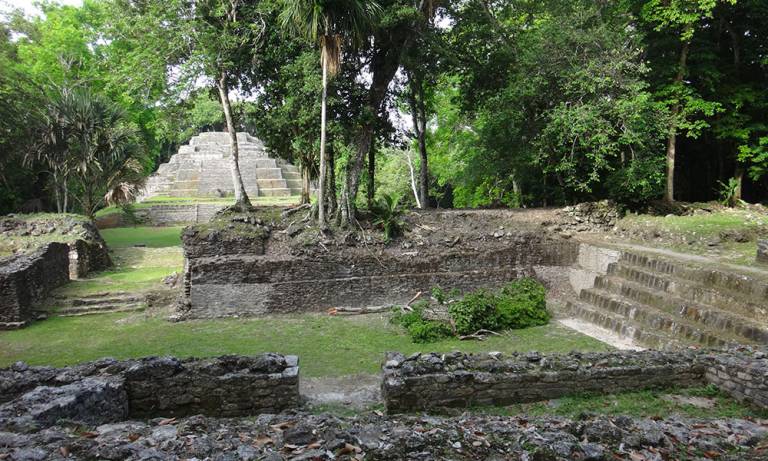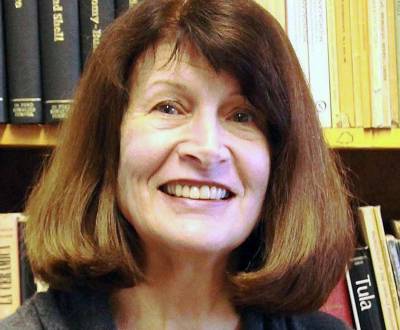Elizabeth Graham gives Rhind Lectures 2023
7 September 2023
Elizabeth Graham (Emeritus Professor, UCL Institute of Archaeology) has been invited to present this year's series of Rhind Lectures by the Society of Antiquaries of Scotland.


The Rhind Lectures, a series of six lectures delivered annually on a subject pertaining to history or archaeology, by eminent authorities, have been given since 1876.
They commemorate Alexander Henry Rhind of Sibster (1833-63) who left a bequest to the Society of Antiquaries of Scotland to endow the lectures which perpetuate his name.
The series of lectures presented this year by Elizabeth Graham will take place from 29 September - 1 October and follow the theme 'What Has Maya Archaeology Done for Us?' These hybrid lectures will take place in Edinburgh (Augustine United Church) and will be live-streamed online.
After introducing Precolumbian Maya civilisation, the lectures will cover Maya intellectual achievements as well as Mesoamerican contributions to modern diet and health. Elizabeth will discuss what we can learn from Maya history about sustainable pathways for urban life, but also cover a more controversial topic concerning the powerful role of commercial interests in social change. She will present an alternative view of the Christianisation of the Maya at Conquest and criticise the common assumption that people—especially the ‘Ancients’—kill people for gods.
Register for the Rhind Lectures 2023
Programme
Friday 29 September
- 5.00pm The Masters of Time: The Maya of Mesoamerica
Elizabeth will introduce the Maya: maps, timelines, environments, distinguishing features of Mesoamerican societies, and an overview of Maya history. Maya timekeeping and astronomy will be the vehicle for insight into Maya thought, but the huge variety of foods, and aspects of agriculture will also be reviewed. - 6.30pm Stone Cities, Green Cities: What We Can Learn from Maya Urbanism
Maya urbanism has been a major research interest of Elizabeth for years. More recently she has worked with a team–including city planners, those in development and food security—who are drawing from Maya urbanism in planning housing and especially the integration of greenspace, and in some cases agriculture, in cities.
Saturday 30 September
- 3pm Not Just Trade but Power: The British East India Company and the Maya Collapse
Elizabeth has excavated coastal sites for much of her career, and she is working on the coast at present. These sites were never abandoned and thrived through the Maya collapse—but they were commercial centres and benefited from the demise of the Maya dynasties. Elizabeth finds the British East India Company to be perfect inspiration for ideas about how Maya merchants were able to undermine traditional trading systems, manipulate those in power, and justify war for trade. - 4.30pm The Idol Rich – Spanish and Maya Christians in the Land That Became Belize
Elizabeth wrote a book on the early conquest period, called Maya Christians and Their Churches in Sixteenth-Century Belize, and she describes her own point of view on how the Maya reacted to evangelisation and the ideas of Christianity.
Sunday 1 October
- 3.00pm What’s Wrong with ‘Human Sacrifice’?
Elizabeth has been doing research on human sacrifice for many years, but she is still working on a number of implications. Many in her field have invested careers in trying to explain why the Maya and Aztecs practiced human sacrifice, but no one thought to question the concept itself. - 4.30pm Past and Future Earth – Clues from the Maya About Sustainable Soils
Elizabeth’s recent research focuses on soils and soil security at the urban site of Lamanai, and on coastal sites on Ambergris Caye. Her and her team are looking at gradual soil formation and increasing soil fertility where human occupation has been dense, with implications for what modern planners consider to be sustainable. Soil security may be more important than climate change, because even if the climate stabilised, soils remain threatened.
The Rhind Lectures 2023 are free and open to all. Thanks are given to the AOC Archaeology Group for sponsoring the events.
 Close
Close

